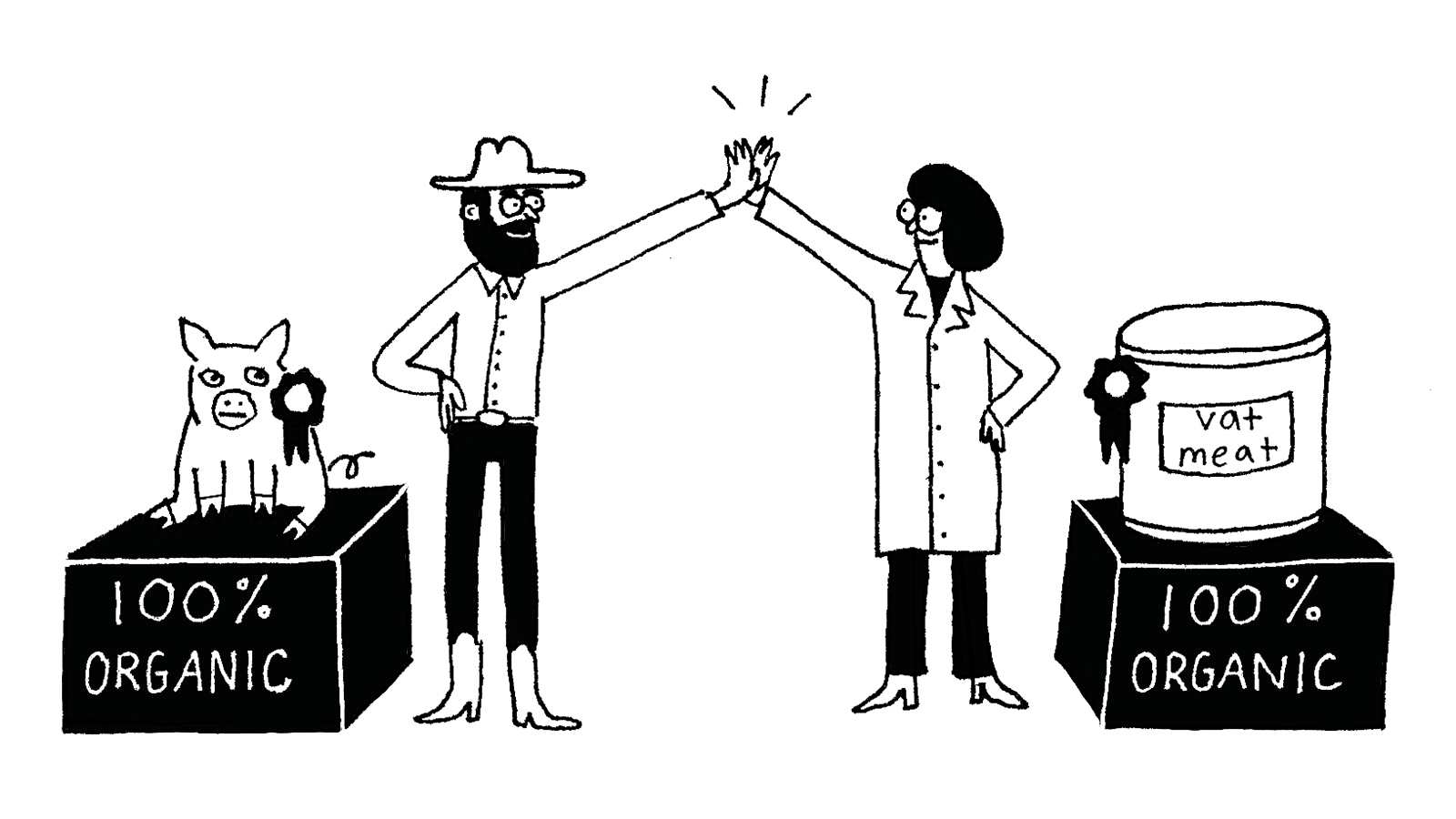When I read Emma Marris’ critical but ultimately hopeful essay about gourmet food (in Breakthrough Journal), my interest was piqued. Marris wrote the book Rambunctious Garden: Saving Nature in a Post-Wild World, and has generated challenging and influential ideas about nature. Now she’s applied some of those same ideas to food.
She argues that a new wave of star chefs can serve as a model for relating more harmoniously to our environment. This means the path to sustainability could be marked by delicious dinners.
I was fascinated by this, but I was also confused. I had always thought of Alice Waters as the foremost example of eating our way to sustainability, yet for Marris, Waters is the counterexample: She criticizes Waters for being impractical and rigid.
I asked Marris about this. Our email conversation, which you can read below, turned into one of those collaborative arguments where — instead of trying to win — we ended up challenging each other to clarify and strengthen our points.
This debate has big implications: Can human intervention and technology — instead of ruining nature — improve it, even make it more “natural”? Is the future of food a polarized choice between dystopian industrialization and a utopian return to the farm? Or can we imagine our way to an industrialization that creates beauty, delight, flavor, and all the romantic qualities we value in food and farming?

Emma Marris
FROM: Nathanael Johnson
TO: Emma Marris
Hey Emma,
The conceit of your essay, as I understand it, is that we’ve got these two competing ways of thinking about sustainable food (and about our relationship with nature more generally), and they are embodied, on the one hand, by Alice Waters and then, on the other side, by this new wave of chefs like René Redzepi and Daniel Patterson. So you have an abstract philosophical argument nicely grounded in real people cooking real food.
In this formulation, Alice Waters stands for a position that’s worshipfully respectful of nature — the cooking is as simple as possible so as to showcase the ingredients. Really, nature is the chef and the cook is just an assistant. And the problem, you say, is that this requires an “impossible-to-scale return to a romanticized version of our agrarian past.”
On the other side you have Redzepi and Patterson, who are truly enchanted with the natural world, but also with technology. And they have no problem wading into nature to start doing all sorts of high-tech tinkering. They aren’t so worried that they’ll muck up perfection. And I think you see this as an evolution: food that’s “fresh-sustainable-innovative-technological-global.”
My hunch is that you see in these young chefs a reflection of your own philosophy. They show that it’s possible to be in love with wilderness and awestruck by non-human life while physically playing with it, rather than taking only memories and leaving only footprints. For me that’s the most exciting idea — that we could maintain the romantic relationship with nature, while also engaging it practically.
OK, does this qualify as mansplaining your own thoughts to you? I actually hoped just to mansplain my interpretation of them, and let you nudge (or wallop) me back into line.
— Nate

Renée Suen 孫詩敏René Redzepi.
FROM: Emma Marris
TO: Nathanael Johnson
So this is pretty much a good summary. I like it when you say that “nature is the chef and the cook is just an assistant” in Waters’ world; that is putting it very well.
I think why Waters’ (and, more popularly, Michael Pollan’s) approach became so imitated is that it is Romantic. And, as we all know, we want our food to be somehow grander and more meaningful than just calories and nutrients (or we would all be eating soylent already).
I love the romance of the Waters way (and the delicious results) but I am troubled by the fact that it doesn’t scale well. Those organic foods with lower yields, grass-fed beef, and other humane meats — it would take just way too much space to do food that way for the entire human population. A lot of affluent people these days only eat “happy meat” and that’s great, but an agricultural economist I know said that if all meat was “happy” it would mean “no pork for the poor,” and that seems unfair. (I know that reasonable people disagree about some of these scaling criticisms.)
What I like about Redzepi and Patterson and their ilk is that although their food is unabashedly elitist, it hints at a way to use technology to lower the environmental damage wrought by food production — but without losing the romance. Their food is incredibly sensitive; their dishes are like poems about time and place and human relationships to the land. But they are doing some of this poetry with food dehydrators and pacojets and other high-tech tools.
To my mind, that’s the way forward. Eventually, we might arrive at a place where something like vat meat or insect protein isn’t a depressing apocalyptic response to overpopulation and environmental degradation, but part of a delicious and thoughtful meal that connects us to nature. Maybe that day is a way off, but we might be able to get there. And that’s kind of my whole goal as I write and think about the environment: how can we solve our problems in a way that is positive and joyful rather than negative and renunciatory and self-flagellative (if that is a word).
Because all the people that are going to sign up for that negative version of environmentalism are already on board, and we now need to reach out and get everyone else interested. Super tasty food will help with that!
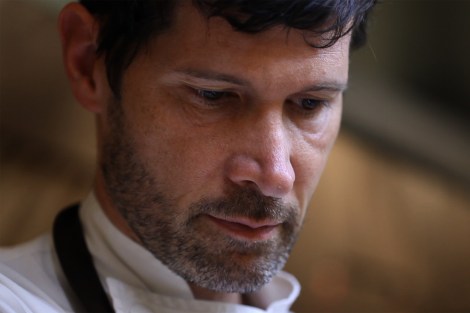
Breville USADaniel Patterson.
FROM: Nathanael Johnson
TO: Emma Marris
I’m totally declaring self-flagellative a word. Flagellative(TM) is also the brand name for my line of prescription pills with cleansing guilt-release action.
I’m completely with you in wanting to be rational and find solutions that actually work while also hanging onto the romantic. I find myself whipsawed between those two groups: the romantics who just want me to celebrate urban gardens without asking pesky questions about numbers and evidence, and the rationalists who value being right more than being happy.
Here’s the thing I struggled with in your essay: I’m not sure Waters and Redzepi/Patterson really fit snugly in the positions you’ve assigned them. You’ve done a great job showing all the ways that Waters deifies nature, while Redzepi and Patterson play with it. But Alice Waters not one of those “freeze nature in a pristine snow globe” people. She has always offered us a way to claim a legitimate place in nature through delight in taste and the conviviality of the dinner table. And I don’t think it’s quite so out of reach as you seem to: Anyone with a few square feet of soil can harvest perfect carrots and whip up a pretty fair version of a Waters recipe.
Whereas, with Redzepi and Patterson, the cuisine really is out of reach. They reject Waters’ simplicity and traditionalism, which has allowed them to do amazing things (I hear — I’ve yet to taste this food). But then simplicity and traditionalism are two qualities that allow more people in — it can be learned, and passed on. I really see Alice Waters’ project as showing people a pragmatic way to be part of nature, to participate in a manner that’s not extractive.
Does it scale? Probably not, when you consider all the meat and the labor. But if it’s elite cuisine (yep) it won’t scale by definition. I guess I don’t understand why there’s a problem with special-occasion-feast food failing to be day-in-day-out food. You don’t charge Redzepi and Patterson with the same crime because they play with technology, which opens the possibility of scaling up. But I’m worried that the vat meat and crickets that are a delicious connection to nature when I eat at Coi are going to turn into dystopian nightmare slurry when we scale it up. Is it really more reasonable to bet on R&P than Waters?
Off to take a Flagellative before bed.
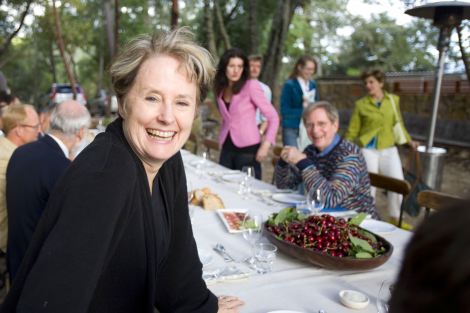
David SifryAlice Waters.
FROM: Emma Marris
TO: Nathanael Johnson
These are good points. Waters isn’t a snow-glober. And her recipe of “fresh, local, seasonal, sustainable, traditional, and simple” is both appealing and, as you note, attainable for many (though not all; working poor people with multiple jobs and inadequate childcare barely have time to make a sandwich, let alone grow green beans).
So my beef with Waters isn’t so much that her approach is bad, it is that her approach has become the only approach for green foodies — that “fresh, local, seasonal, sustainable, traditional, and simple” has come to so thoroughly dominate the cultural discourse around food.
Redzepi and Patterson and Chang and others may not have a coherent recipe for how regular people should eat, but they are at least mixing things up a little bit and giving us other options to consider. And I like the fact that their new options retain the romance with nature while ditching the “simple” and “traditional” parts of the formula.
I am not anti-Waters. I cook from her cookbook (and it is possible to do so, unlike the Noma and Coi books). But I am interested in examining the (occasionally slightly smug) confidence that today’s green foodies often exhibit that simple, organic, farm-to-table locavorism is the royal road to goodness.
On scaling up the weird-in-a-good-way food of Patterson and Redzepi, I am not completely sure what I think. Redzepi writes in his journal about challenging his staff to come up with recipes for parts of food that are normally thrown away, like fish scales, and this is something that can and should scale up. Food waste is a huge problem. (And Redzepi isn’t alone here. “Nose to tail” and “stem to root” eating have been a trend for awhile now.) But I hope some of their fancy tools and technologies can trickle down, too.
More broadly, their willingness to be experimental and technological is something I think we could all benefit from. We are all pretty conservative when it comes to food. It makes sense that we would be. Not only is food an important way we declare our belongingness to groups (I eat cod because I am Norwegian-American, salmon because I grew up in Seattle, and kale because I am politically liberal), but it also makes evolutionary sense that we would be cautious with new foods. They might kill us!
But if we can push that a little and become more willing to try the unfamiliar and weird, more solutions will be open to us. When I first heard about vat meat I was nauseated, but now I can’t wait for it to arrive, because I love pork, and lab pork could solve so many environmental and ethical problems with raising pigs for meat.

Larry HalffFrom Daniel Patterson’s Coi: young carrots roasted in hay.
FROM: Nathanael Johnson
TO: Emma Marris
I’ll start with a couple of comments on interesting, but maybe tangential, points:
First, I absolutely agree that not everyone can afford fresh, delicious food — though I think we’d save on healthcare costs in the long run if we did more to subsidize good food for people who can’t afford it.
Second, nose-to-tail cooking is fantastic and has stirred a lot of creativity, yet it’s lightyears behind the corporate meat industry in many ways. There, the profit motive has driven people to amazing feats of creativity so that they can use every part of the animal. One result is that we have things like pink slime. Nose-to-tail has its grotesqueries as well. The difference is that we tend to trust the elite chefs more than the corporations (with good reason).
OK, on to the main course (after that amuse bouche of lean, finely textured beef). I see what you mean with regards to Alice Waters. Her message has been so successful (inside our green silo) that it’s taken up all the room, so that alternatives are anathema. You could imagine that if one of these chefs started experimenting with genetically modified bacteria to ferment food waste into the most delicious sauces, it would be totally green — and total apostasy. You quoted Daniel Patterson on this, and it’s such a great quote that I’m going to reproduce it here:
Alice Waters … has become to us what Beatrice was to Dante: a model of righteousness and purity, reminding us of our past sins while offering encouragement and inspiration on the path to heaven. The only path to heaven. So deeply embedded is the mythology of Chez Panisse in the DNA of local food culture that it threatens to smother stylistic diversity and extinguish the creativity that it originally sought to spark.
I might have scoffed at Patterson a few years ago, but since I started seriously reporting on food, I’ve had a chance to see how dogmatic people have gotten about this. And yet: Chez Panisse is just one restaurant in Berkeley. How can you say that it is smothering diversity when there are still McDonald’s in every country, except North Korea, Bolivia, and Iceland? It looks like the philosophy Waters joined and fomented was responsible for the ouster from Bolivia, but in most places, the Golden Arches stand victorious. It’s not like Alice Waters is taking up all the space.
I suppose, though, that she does take up a lot of space in our little silo of people who love food and care intensely about the environment. It sounds like the reason you have a beef with Waters is actually because you want something very close to the “delicious revolution” she led. I would be willing to go to the barricades for a delicious revolution 2.0, with all the delight, romance, engagement with nature, and sustainability — but also with room to adapt and evolve.
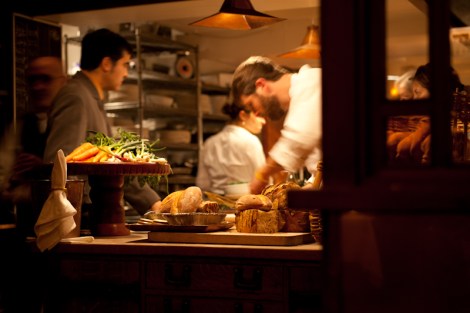
Andi FisherInside Chez Panisse.
FROM: Emma Marris
TO: Nathanael Johnson
I think Waters’ ethic, especially since Pollan got on board, is more pervasive than you think. It gets at least lip service in every sector of the U.S. food world, from supermarket displays (local produce is now prominently signed at the Klamath Falls Fred Meyer) to fast food, where Chipotle touts its “food with integrity” and humanely raised meat and even McDonald’s latest sandwich is described as having an “artisan roll,” whatever that could possibly mean. On the McDonald’s website, there are “Supplier Stories,” videos about ranchers that can help the customer “know your farmer,” as Waters suggests.
Now, obviously, some of these attempts to hop on the bandwagon are laughable, but they suggest that Big Food is taking consumer’s awakening to the whole food chain seriously. So far the result is mostly platitudes, but there are real effects too, like all the stuff you report on. So if “we” in the green silo are going to influence Big Food, it might be nice to be open to lots of options and technologies and flavors and not lock down into a single ideology that — tasty as it definitely is — might limit our options down the line.
And besides: “Prather Ranch beef encrusted in lichen,” “dessert of carrot and sea buckthorn,” and “silken fresh cheese and crispy beech leaves”? This food is just so interesting. I’ll eat a fabulous free range chicken or Waters’ “Garden greens and goat cheese pasta” any night of the week. But once in a while, give me some live ants on the plate.
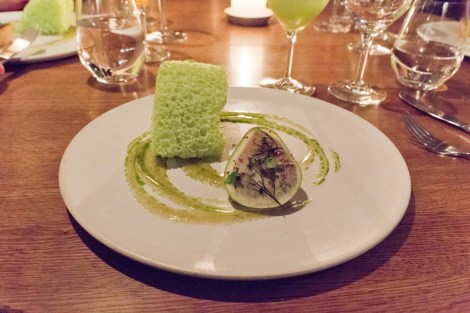
From Redzepi’s NOMA: pear with pine parfait.
FROM: Nathanael Johnson
TO: Emma Marris
I’ve actually spent a lot of time considering lichen, but I’ve never wondered what it would taste like until now. And I love beech trees, even though they aren’t local. I might just have to squeeze the last coins from my wallet for a trip over to Coi.

